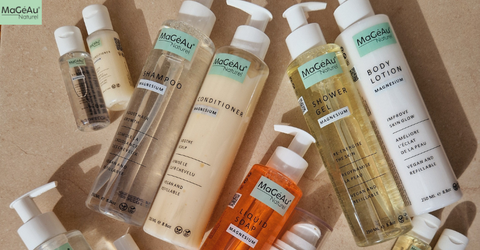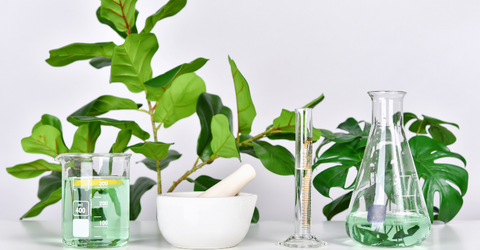In the era of heightened awareness surrounding skincare, terms like "clean" and "natural" have taken centre stage and become buzzwords, creating ripples of curiosity among skincare enthusiasts. With consumers becoming increasingly discerning about product ingredients and environmental impact awareness increasing, the beauty industry is witnessing a shift towards sustainability and quality like never before.
Consumers are now becoming more knowledgeable about skincare, product ingredients and the environmental damage and consequences that the products and their packaging cause. The beauty industry and the brands are focusing on sustainability and top-notch quality factors, trying to keep its products as healthy as possible. It's like upgrading from basic skincare to the VIP lounge of the cosmetic world.
Recently terms like clean, natural and organic have gotten popular. But every brand has its own meaning of these terms that somehow might confuse you. To clear your confusion, let's clarify those terms.
What is Clean Skincare?
Clean skincare means the product only contains plant-based, natural ingredients and are free from all toxic ingredients like sulphates, parabens, silicones, pesticides, petroleum products and artificial colours. In other words, free from all harmful chemicals and synthetic acids like alpha hydroxy acids, salicylic acid and lactic acid. Clean beauty or skincare is made with ingredients that are proven to be safe.
Dermatologists advocate clean beauty and skincare for sensitive skin since they protect the skin from harsh chemicals and allergic reactions.
Are Clean Beauty Skincare All-Natural?
To the most trending question about clean beauty you will find on the internet today, the answer is no as clean doesn't necessarily mean all-natural.
Natural doesn’t always mean the product is safe. Most skincare brands propose 95% to 97% natural ingredients in their formula. Meaning there are still 3% to 5% of chemical ingredients.
Additionally, some natural ingredients can also be as harmful on your skin as the synthetic ones. Do your due diligence and research before using natural and clean skincare. Patch test them first on your skin to find out whether they are safe or not and if you have any allergic reactions.
What does Clean Beauty Mean?
Clean skincare’s composition is based on plant, natural ingredients, free from the toxic elements like sulphates, parabens, silicones, pesticides, petroleum, and artificial colours. It's the skincare that leaves your skin feeling harmonious and happy.
Dermatologists champion clean beauty, especially for sensitive skin, providing a shield against harsh chemicals and allergic reactions. It's like giving your skin a spa day with ingredients that have been declared safe for the VIP treatment.
To qualify as clean, skincare products must embody certain attributes such as vegan, eco-friendly, sustainable, safe for you and for the environment, plant-derived and cruelty-free.
What is Natural Skincare?
The second most popular term found in the beauty and skincare industry is “natural.”
Natural skincare products means that all the ingredients are derived from nature including the oils, extracts, butters and salts. In other simple words the products that are made from botanically sourced ingredients without using any synthetic chemicals.
Natural Ingredients
Not every natural ingredient is for every skin type. As mentioned earlier, “Natural” doesn’t always mean it’s better or safer since most formulations in the beauty industry are composed of 95% or 97% natural skincare, the remaining percentage being chemical thus harmful. Companies and brands might claim that their products are truly natural and are made from all the natural ingredients, however a new European regulation is coming to the rescue of the customer.
It is important to study the ingredients list before using natural skincare. Analysing your skin reaction, depending on your skin type, will help you define your clean beauty essentials. To find out, keep on reading.
How to Choose the Best Skincare for Your Skin Type?
Choosing the ideal skincare routine resides in understanding your skin type. Whether you possess oily, dry, normal, combination, or sensitive skin, identifying your unique needs is crucial. With characteristics ranging from excess sebum production to redness and irritation, each skin type demands tailored care.
Identify Your Skin Type
According to Michele Green M.D, a dermatologist, the best factor in determining your skincare is to know your skin type. The best skincare applied on the wrong skin type, can be a disaster.
There are 5 major skin types, oily, dry, normal, combination, and sensitive.
How to identify skin type?
Each skin type has common characteristics,
Oily skin - Oily skin tends to produce excess sebum, leading to a shiny appearance, particularly in the T-zone, which feels greasy.
It's characterised by fewer wrinkles due to the natural oils that keep the skin hydrated. Yet, oily skin also needs moisture.
Enlarged pores are a common feature of oily skin, often contributing to its texture.
Acne, blemishes, blackheads, and whiteheads are frequent concerns associated with oily skin types.
Dry skin - Dry skin tends to produce less oil, resulting in a lack of natural moisture.
It often appears dull, rough, and may develop flakiness and scaliness, especially in harsh weather conditions.
Dehydrated and lacking moisture, dry skin often feels tight and uncomfortable.
Visible fine lines may be more pronounced on dry skin due to its lack of hydration.
Dry skin can also feel itchy and irritated, especially if not properly moisturised.
Normal skin - Normal skin is characterised by a balanced oil production, neither too dry nor too oily.
It typically features small pores, contributing to its smooth texture and appearance.
Individuals with normal skin usually experience minimal breakouts or flakiness.
With its well-maintained moisture levels, normal skin often maintains a healthy and radiant complexion.
Combination skin - Combination skin is a mix of oiliness and dryness across different areas of the face.
The T-zone, consisting of the forehead, nose, and chin, tends to be oilier than the rest of the face.
In contrast, the cheeks and other areas may experience dryness or normal skin conditions.
Managing combination skin requires targeted skincare approaches to address the diverse needs of different facial regions.
Sensitive skin - Sensitive skin can manifest as either oily or dry, making it challenging to manage.
Individuals with sensitive skin often experience redness, which can be exacerbated by various factors such as environmental triggers or skincare products.
Burning and itchiness are common sensations associated with sensitive skin, indicating heightened reactivity to certain ingredients or environmental conditions.
Don't Buy into the Hype
In a world dominated by influencer endorsements and marketing gimmicks, it's imperative to exercise caution. Recommendations, rating and reviews are the best way to see the quality of a product. Seeing others trying and applying skincare is also very helpful. Bare in mind, pictures have special lighting, the influencers professional makeup and the videos edited. Nowadays the brands are using famous influencers to promote their products to reach a bigger audience and touch different communities thanks to collaboration.
No matter how much hype, read skincare ingredients list and do your research to check how those ingredients will react and work on your skin type. Scrutinise ingredient lists to steer clear of harmful additives like fragrance, sulphates, and parabens, and prioritise skincare that align with your skin's needs and your values.
Avoid Harmful Ingredients
On our journey to create a 100% natural skincare, I have identified with toxicologists harmful and toxic ingredients commonly found in skincare. Avoid purchasing any skincare items containing:
Fragrance or perfume, as these additives cause skin allergies and irritation.
Sulphates, which act as cleansing agents but can strip natural oils from hair and skin, leading to dryness and irritation.
Parabens, utilised as chemical preservatives to prevent bacterial growth, become harmful over time and pose risks to hormone levels and contribute to breast cancer.
Patch Test
Before committing to a new clean or natural skincare product conduct a patch test to assess its compatibility with your skin. A patch test will help you find out if the ingredients in the products will cause any allergic reactions. Massage the product in a small area and wait for at least 24-hour.
This simple yet effective practice can preempt potential allergic reactions, saving you both money and discomfort in the long run.
Unlocking MaGéAu Naturel Experience
At MaGéAu Naturel, we pledge to deliver skincare that exceeds our customers' needs and expectations in terms of sustainability and results. Our skincare harnesses the power of natural ingredients since they are 100% natural and vegan, meaning safe for the whole family. With a commitment to gender-neutral formulations and uncompromising quality, we invite you to experience skincare that's as pure as it is effective.
Join our Skincare (R)Evolution
As a token of appreciation, we're offering an exclusive 10% saving on our sets with the code MAGEAU10. Elevate your skincare routine with MaGéAu Naturel and revel in the beauty of naturally radiant skin. Place your order today and embark on a journey towards holistic skincare bliss.





Comments (0)
There are no comments for this article. Be the first one to leave a message!